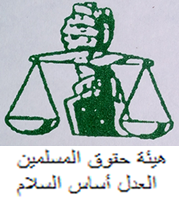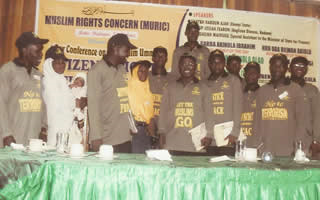12th January, 2022
PRESS RELEASE
MURIC HAILS EL-RUFAI ON 4-DAY WORKING WEEK
As schools resumed on 10th January, 2022 for the second term in the academic session, Governor Nasir El-Rufai of Kaduna State has directed that all schools in the state should operate a four-day school week. It will be recalled that all civil servants began the same four-day working week about five weeks ago.
Meanwhile an Islamic human rights organisation, the Muslim Rights Concern (MURIC) has hailed the governor for the decision. The group described the governor’s decision as visionary, equitable and humane.
The group expressed its opinion through its director and founder, Professor Ishaq Akintola, on Wednesday, 12th January, 2022.
MURIC said :
“Governor Nasir El-Rufai has made good his promise to operate a four-day working week in both the education sector and the civil service. Schools in Kaduna State were directed to commence the four-day working week on Monday 10th January, 2022 while civil servants began operating the new system about five weeks ago. This Friday will mark the first school-free and work-free Friday in the State. It means, technically, that Friday has become free in Kaduna State.
“We commend El-Rufai for this initiative. It is bold, visionary, equitable and humane. We have no iota of doubt that it will improve the health of individual civil servants as they now have more time to rest and check their health status. Teachers will also be free from the hustle and bustle from the classroom to the staff room and thereafter to the traffic congestion on their way home.
“According to the state government the four-day working week will boost productivity, improve work-life balance and enable workers to have more time for their families, for rest and for agriculture. We consider these benefits as low hanging fruits.
“The long term advantages are far more beneficial to the state and its citizens. Capitalism drives the proletariat to death. The four-day working policy is capable of building a more balanced citizenry in the state. Man is known to be composed of body, soul and spirit. Unfortunately both democracy and capitalism only cater for the body alone, leaving the spirit and the soul to fend for themselves in a world replete with misadventures.
“Considering the fact that Kaduna is a Muslim majority state, the conventional five-day working week has served as a barrier between the average Muslim in the state and his opportunity to get sanctified. Spiritual fulfilment and religious guidance have been missing in the lives of majority of the civil servants, teachers and students in the state who have had to be at work or in the school every Friday under the five-day working week.
“Unfortunately this situation is true in the remaining core northern states as well as other states of Nigeria where Muslims exist. A practical visualisation may explain this better. The average Muslim worker must go to work every Friday. He may or may not be allowed to enjoy the one or two hours break from 1 pm to 3 pm on that day to attend Jumu’ah prayer.
“Even then he rushes to the mosque from work and dashes back to work immediately after the Salat. More often than not he misses the sermon or joins other congregants halfway. He gains little or no knowledge at all from the weekly sermon as a result of his regular late arrival since Friday is not free.
“Meanwhile members of his family are scattered like wild oats on Friday. He works in the ministry at the state secretariat. His wife is a teacher in a school several kilometres away from his own place of work. The three children are in different schools located in different places around the city. Therefore they cannot attend the same mosque together and listen to the same sermon.
“This has very serious implications. The family cannot deliberate on the day’s sermon at home because they did not attend the same mosque. The Muslim parents cannot effectively use examples given by the Imam to teach their children at home. Therefore, it makes no impact on the children because they did not hear it themselves in the company of their parents. This makes a lot of difference.
“With hindsight, Governor El-Rufai appears to have actualised the vision of the director of MURIC as envisaged in the latter’s 138-page book, The Friday Question, which was published in 1993. He also seems to have made good use of the suggestions offered by the author as solution to the problem. El-Rufai is a foremost strategist thinker.
“The rising criminality in the North today, from Boko Haram to banditry, can be attributed to this Friday question. Those armed Muslim youths have always missed the Friday sermon. Nothing symbolises Islam in them except the Muslim names. Working and schooling on Friday has deprived the Muslim family of the necessary domestic cohesion and the attendant moral discipline. El-Rufai deserves encomiums for his vision and dynamism. He has virtually united the Muslim family.
“In comparison, the Christian family has gained tremendously in terms of spiritual fulfilment every Sunday because the day is free. The average Christian worker or student goes to church on Sunday morning with little or no stress at all. The whole family goes to the same church and listens to the same sermon. They go home together to discuss the day’s message.
“It is very glaring from the above comparison that the Nigerian system does not treat Christians and Muslims the same way. Christianisation is systemic. This country is grossly Christianised and states with Muslim majorities must start thinking outside the box. It is time to liberate Nigerian Muslims from the iron grips of Christo-Western neo-imperialism. MURIC gives kudos to El-Rufai for emancipating Kaduna Muslims from spiritual blindness.
“MURIC charges governors in core Northern states where Muslims are in absolute majority to emulate El-Rufai by declaring a similar four-day working week in their states. If it is good in Kaduna, it must be good in Kano, Katsina, Sokoto, Gombe, etc. Liberate your Muslim citizens from religious captivity and spiritual enslavement.
“Ceteris paribus, the Zamfarisation of Shari’ah must necessitate the Kadunisation of the Friday question. If Shari’ah can spread from Zamfara State to about twelve northern states within a very short time, nothing stops the Friday question from spreading its tentacles from Kaduna to other Northern states in the next five years.
“We call on Islamic scholars, Muslim intellectuals and Islamic organisations in the northern part of the country to play the role of enlightenment in this campaign while lobbying the state governors on the need to find a solution to the Friday question in their states.”
Professor Ishaq Akintola,
Director,
Muslim Rights Concern (MURIC)





